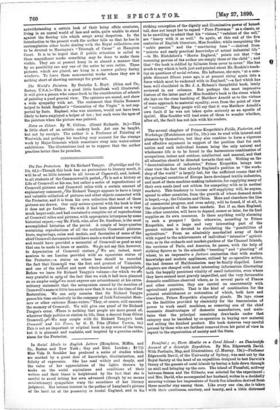The Two Protectors. By Sir Richard Tangye. (Partridge and Co
10s. 6d.)—Though this book has no pretensions to literary merit, it will be of no little interest to all lovers of Cronwell, and, indeed, to all students of the Commonwealth period./it is not a history or Life of Cromwell or his son, but rather a series of reproductions of Cromwell pictures and Cromwell relics with a certain amount of explanatory comment/Sir Richard Tangye appears to have a large and valuable collection of pictures and other objects connected with the Protector, and it is from his own collection that most of these pictures are drawn. Our only serious quarrel with the book is that It does not go further. We wish it had been planned on a very much larger scale, and had contained a complete set of reproductions of Cromwell relics and pictures, with appropriate letterpress by some historical expert,—say Mr. Firth, who, after Dr. Gardiner, is the most accomplished historian of the period. A couple of large quartos containing reproductions of all the authentic Cromwell pictures, busts, engravings, coins and medals, and facsimiles of some of the chief Cromwell documents would have made a work of immense value, and.would have provided a memorial of Cromwell as good as any that can be made in brass or marble. Wyo not say this, however, In depreciation of Cromwell statues. We are, indeed, most anxious to see London provided with an equestrian statue of the Protector,—a statue on whose base should be recorded the fact that Crommell was the first and greatest of Unionists, and one of the noblest and most whole-hearted of Imperialists,/ Before we leave Sir Richard Tangye's volume—for which we Oe very grateful in sp of the fact that we wish it hatl been planned DII an ampler seal we must express our astonishment at his extra- ordinary statement that the antagonism caused by the mention of Cromwell's name is little less acute now than it was at the time of the Restoration. We can only surmise that Sir Richard Tangye passes his time exclusively in the company of Irish Nationalist Mem- bers or other extreme Home-rulers.'"They, of course, still execrate the memory of Cromwell. We will give one proof of Sir Richard Tangye's error. there is nothing that people are more proud of, whatever t;1'.r politics or station in life, than a descent from Oliver Cromwell. We may couple with Sir Richard Tangye's book Cromwell and kis Times, by G. H. Pike (Fisher Unwin, 6s.) This is not an important or original book in any sense of the term, but it is pleasant and readable, and inspired by a genuine enthu- siasm for the Protector.






































 Previous page
Previous page